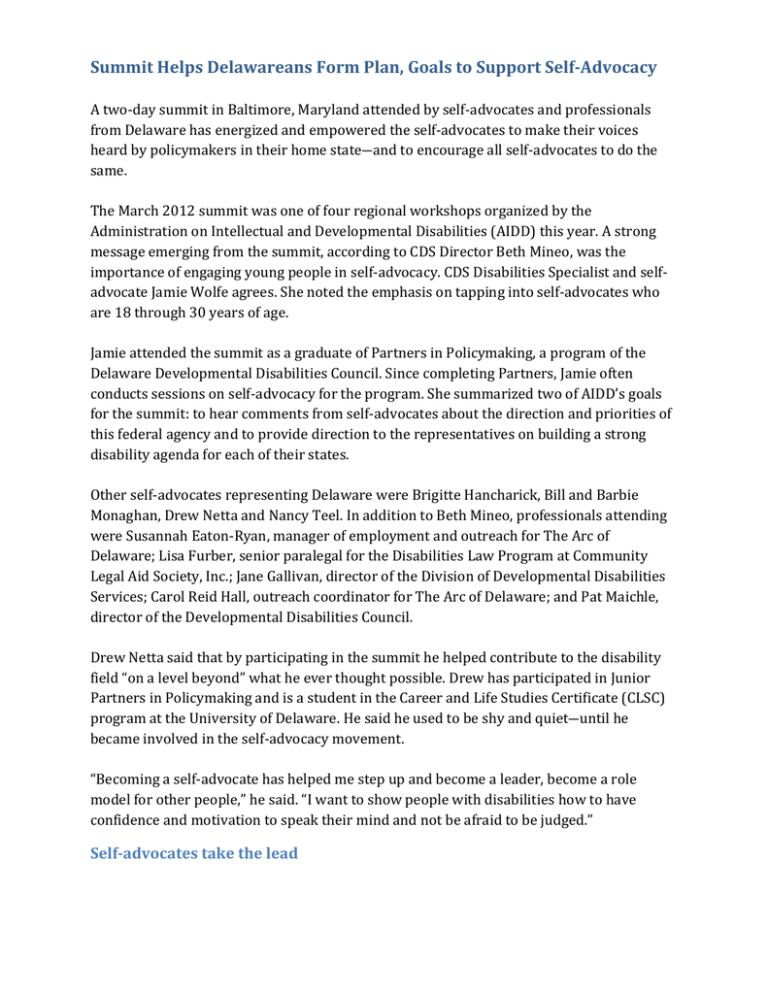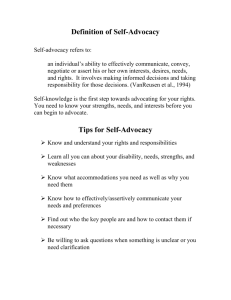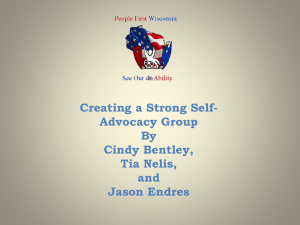Summit Helps Delawareans Form Plan, Goals to Support Self-Advocacy
advertisement

Summit Helps Delawareans Form Plan, Goals to Support Self-Advocacy A two-day summit in Baltimore, Maryland attended by self-advocates and professionals from Delaware has energized and empowered the self-advocates to make their voices heard by policymakers in their home state―and to encourage all self-advocates to do the same. The March 2012 summit was one of four regional workshops organized by the Administration on Intellectual and Developmental Disabilities (AIDD) this year. A strong message emerging from the summit, according to CDS Director Beth Mineo, was the importance of engaging young people in self-advocacy. CDS Disabilities Specialist and selfadvocate Jamie Wolfe agrees. She noted the emphasis on tapping into self-advocates who are 18 through 30 years of age. Jamie attended the summit as a graduate of Partners in Policymaking, a program of the Delaware Developmental Disabilities Council. Since completing Partners, Jamie often conducts sessions on self-advocacy for the program. She summarized two of AIDD’s goals for the summit: to hear comments from self-advocates about the direction and priorities of this federal agency and to provide direction to the representatives on building a strong disability agenda for each of their states. Other self-advocates representing Delaware were Brigitte Hancharick, Bill and Barbie Monaghan, Drew Netta and Nancy Teel. In addition to Beth Mineo, professionals attending were Susannah Eaton-Ryan, manager of employment and outreach for The Arc of Delaware; Lisa Furber, senior paralegal for the Disabilities Law Program at Community Legal Aid Society, Inc.; Jane Gallivan, director of the Division of Developmental Disabilities Services; Carol Reid Hall, outreach coordinator for The Arc of Delaware; and Pat Maichle, director of the Developmental Disabilities Council. Drew Netta said that by participating in the summit he helped contribute to the disability field “on a level beyond” what he ever thought possible. Drew has participated in Junior Partners in Policymaking and is a student in the Career and Life Studies Certificate (CLSC) program at the University of Delaware. He said he used to be shy and quiet―until he became involved in the self-advocacy movement. “Becoming a self-advocate has helped me step up and become a leader, become a role model for other people,” he said. “I want to show people with disabilities how to have confidence and motivation to speak their mind and not be afraid to be judged.” Self-advocates take the lead The summit was structured to ensure that self-advocates would take the lead in developing plans and making decisions for their states, Lisa Furber explained. AIDD Commissioner Sharon Lewis (who convened the summit) wasn’t expecting the professionals to do everything, Pat Maichle observed, but instead just be a support for the self-advocates. “We were supposed to let the self-advocates take the reins: be in control of the discussion, presentation, decisions and recommendations. When the summit facilitators met with the Delaware group, they only called on the self-advocates. This approach was successful,” Pat said. Jane Gallivan noted that it was “challenging” to let the self-advocates take the lead. “It takes time and a trained facilitator to get this process to work, but at the end, everyone benefits.” Because of her experience in state government, she was able to answer the self-advocates’ questions about the role of government and Medicaid and Medicare. Carol Reid-Hall agreed that the most important part of the summit was the people running it. “They deferred to the self-advocates always—they wanted to hear from the selfadvocates first [then the professionals].” Nancy Teel liked that the self-advocates sometimes met in one room, the professionals in another. “It was a good way to pick our brains,” she said. Delaware’s self-advocates made all of the presentations on behalf of the state’s delegation, which was not the case for all of the states, Lisa pointed out. Beth Mineo said she was very happy with the group’s dynamics; the self-advocates assumed the leadership role with ease and everyone else supported them. “The team from Delaware was very cohesive.” The Summit’s Importance to Delaware Before attending the summit, Delaware state team members met to outline the successes and challenges of the self-advocacy movement in the state. Self-advocates in Delaware have a history of advocating at the state level for services and supports, often under the leadership of graduates of the Partners in Policymaking program. Self-advocates serve on various boards, state councils and committees, act as teachers and mentors, and influence state legislation and budgets. Nancy found it “really, really fantastic” to meet people from different states and compare their situations to Delaware’s. She and other delegates agreed that, despite many successes, Delawareans continue to face a number of obstacles to improving self-advocacy efforts. The lack of transportation is one of the biggest barriers for people with disabilities, according to Bill and Barbie Monaghan. As president of the People First program in New Castle County, Bill tries to help members with transportation and other issues so they can participate in this self-advocacy organization. On the first day of the summit, Bill and Jamie reported on the plan the delegates had developed for Delaware. Transportation was the focus of two of their goals: (1) to establish Sunday and evening accessible bus service and (2) to assure that a self-advocate is at the transportation decision-making table whenever changes are made that affect the disability community. Other goals involved self-determination, the Employment First initiative and the Money Follows the Person program for all people with disabilities. After hearing from members of each state team, the Delaware delegation met to define state and national goals for the future. The first state-level goal is to establish individualized self-directed community-based services and supports for people with all types of disabilities. Terri Hancharick, who attended the conference with her daughter Brigitte, a self-advocate, explained that self-directed support means that instead of funding flowing to an agency or to a building, it would be given directly to the person with a disability to choose his or her own supports. “Brigitte, who has multiple disabilities, uses a wheelchair and is nonverbal, could use that money to attend conferences and travel to increase her self-advocacy,” Terri said. “She could also use it for tuition for classes where she’s matriculated with typical college students. We’re hoping that this summit will push us farther in the direction of selfdirected supports and give self-advocates more leadership roles in the community.” The second state-level goal is to survey people with disabilities to determine what they “want, need and are willing to do with regard to self-advocacy.” Drew and Jamie were selected to begin reviewing resources that already exist in Delaware and identify whose voices are missing. Perspective on the National Agenda On the second day of the summit, Drew and Barbie presented the Delaware team’s recommendations for advocacy and action on a national level. The first recommendation is for AIDD to develop a national anti-stigma campaign that is culturally, linguistically and ethnically sensitive—a recommendation that struck home for many members of the team. Barbie said she is “so happy they put in the law for the R-word.” She was referring to “Rosa’s law,” signed by President Barack Obama in 2010. It mandates that federal statutes will no longer use the term mental retardation—the replacement phrase is intellectual disability. Barbie shared her own experiences of having been labeled by a reporter with the R-word and needing to explain the nature of her disability. The second policy recommendation requires agencies in the developmental disabilities network to work together on a plan to strengthen self-advocacy by improving accessibility and using respectable language, as well as supporting the hiring of individuals with disabilities by the network partners. Moving Forward Although there is much work left to be done to accomplish these goals at the state and national levels, both the self-advocates and professionals on Delaware’s team believe that the summit was a game-changer in the conversation about self-advocacy. “Sharon Lewis made us realize the power of self-advocates,” Pat Maichle stated. Jane Gallivan said she thought the summit made us begin to take a look at what we’re doing in the state. Carol Reid-Hall, who serves as the advisor for the Kent County People First program, agrees that Delaware needs more emphasis on self-advocacy. She noted that some state governments include a self-advocacy position held by a person with a disability. While Carol would like to see a push for such a position or department in Delaware, she also suggested the formation of a self-advocacy group that legislators can consult for their expertise on disability issues. The summit reinforced the importance of self-advocacy for Bill, who said he learned to become a stronger self-advocate. He hopes to use what he learned at the summit to train more advocates to be stronger through participation in People First. Terri said that being able to attend such meetings is Brigitte’s way of contributing. “Just seeing her at the table, her presence, is advocating for her. People see Brigitte and know that individuals like her can be part of the community and enrich the community.” The summit also helped Drew think more about his future in the field of self-advocacy. “When people usually think about what ‘disability’ means, they think of something that holds you back. I see it as a gift, something I was blessed with, that really motivates me. I’ve become so independent, with the support of my advisors and student coaches. They’ve helped me gain so much confidence. Now I want to set an example and inspire others to do things they may never have thought possible for them.”


